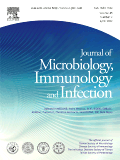
JOURNAL OF MICROBIOLOGY IMMUNOLOGY AND INFECTION
Scope & Guideline
Unlocking the mysteries of infection and immunity.
Introduction
Aims and Scopes
- Clinical Microbiology and Infectious Diseases:
The journal emphasizes research on various infectious diseases, including bacterial, viral, and fungal pathogens. Studies often focus on clinical characteristics, treatment outcomes, and antimicrobial resistance patterns. - Immunology and Host Response:
Research that explores the immune response to infections, vaccine efficacy, and the interplay between pathogens and the host's immune system is a central theme. This includes studies on T-cell responses, antibody production, and immunological markers. - Antimicrobial Resistance:
A significant focus is placed on understanding the mechanisms and epidemiology of antimicrobial resistance, particularly among gram-negative bacteria and other clinically relevant pathogens. This includes studies on resistance genes, phenotypic resistance, and the impact of antimicrobial stewardship. - Epidemiology and Public Health:
The journal publishes research that investigates the epidemiological trends of infectious diseases, including outbreaks, risk factors, and population-based studies that inform public health strategies. - Innovative Diagnostic Methods:
Research on novel diagnostic techniques, including molecular methods like PCR and metagenomics, is also highlighted, reflecting the journal's commitment to improving diagnostic accuracy and speed for infectious diseases.
Trending and Emerging
- COVID-19 Research:
Research related to COVID-19, including its clinical manifestations, treatment protocols, and long-term sequelae, has surged. This reflects the pandemic's significant impact on global health and the urgent need for understanding its implications. - Antimicrobial Stewardship and Resistance:
There is an increasing focus on studies addressing antimicrobial stewardship programs, strategies to combat antimicrobial resistance, and the development of novel antimicrobial agents. - Long COVID and Post-Infectious Syndromes:
Emerging studies on Long COVID and other post-infectious syndromes are gaining attention, highlighting the need for ongoing research into the long-term effects of viral infections. - Vaccine Development and Response:
Research on vaccine efficacy, safety, and the immune response to various vaccines, especially in immunocompromised populations, is trending, reflecting the global emphasis on vaccination as a public health strategy. - Microbiome Studies:
Investigation into the role of the microbiome in health and disease, particularly its interaction with infectious agents and impact on treatment outcomes, is gaining traction.
Declining or Waning
- Non-Infectious Disease-Related Immunology:
Research focusing solely on immunology without a direct connection to infectious diseases appears to be waning. The journal's current trend favors studies that link immunological mechanisms to infectious disease outcomes. - Traditional Laboratory Techniques:
There is a noticeable decline in studies relying solely on traditional microbiological techniques, such as culture-based methods, as newer, more rapid diagnostic methods gain traction. - Epidemiological Studies of Established Pathogens:
Epidemiological research on well-established pathogens, which previously received significant attention, is becoming less frequent as emerging pathogens and their associated diseases take precedence. - Localized Studies:
Studies focused on localized outbreaks or regional infections without broader implications or connections to global health concerns are less common, possibly due to a shift towards research with wider applicability.
Similar Journals
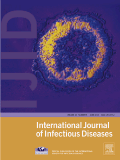
INTERNATIONAL JOURNAL OF INFECTIOUS DISEASES
Advancing global insights in infectious diseases.INTERNATIONAL JOURNAL OF INFECTIOUS DISEASES, published by ELSEVIER SCI LTD, stands as a leading platform in the realm of infectious diseases, contributing significantly to the global understanding of this critical field. With an impressive impact factor, the journal maintains a distinguished Q1 ranking across various categories, including Infectious Diseases, Medicine (miscellaneous), and Medical Microbiology, demonstrating its high relevance and influence among contemporary research. Since its inception in 1996, it has embraced an Open Access model, allowing for wider dissemination of essential research findings that can inform public health policies and clinical practices. With a commitment to advancing scientific knowledge, this journal is not only a vital resource for researchers and professionals but also serves as an invaluable educational tool for students interested in the complexities of infectious diseases and their management. For those looking to stay at the forefront of research and innovation in this field, the INTERNATIONAL JOURNAL OF INFECTIOUS DISEASES is an indispensable resource.
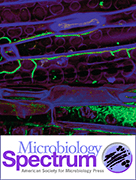
Microbiology Spectrum
Fostering collaboration through open access innovation.Microbiology Spectrum is a prominent peer-reviewed journal published by the American Society for Microbiology, dedicated to advancing the field of microbiology through the dissemination of high-quality research. Since its inception in 2013 and continuing until 2024, the journal has established a strong presence in key domains such as microbiology, immunology, cell biology, and ecology, achieving impressive quartile rankings including Q1 in Infectious Diseases and Q1 in Immunology and Microbiology as of 2023. With an emphasis on open access to its scholarly content, Microbiology Spectrum aims to foster collaboration and knowledge sharing among researchers, professionals, and students alike. The journal's scope encompasses a diverse range of topics pertinent to the field, making it an essential resource for anyone involved in microbiological research and its applications. Researchers looking to publish their findings in a respected journal will find Microbiology Spectrum's robust impact factor and Scopus rankings serve as testament to its significance and influence within the academic community.
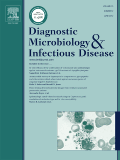
DIAGNOSTIC MICROBIOLOGY AND INFECTIOUS DISEASE
Unraveling Complexities in Microbial DiagnosticsDIAGNOSTIC MICROBIOLOGY AND INFECTIOUS DISEASE, published by Elsevier Science Inc, is a leading journal in the fields of Infectious Diseases, Microbiology, and Medicine. Since its inception in 1983, this esteemed journal has consistently provided a platform for original research and comprehensive reviews that advance the understanding of diagnostic microbiology and its implications for infectious diseases. With an impressive impact factor placing it in the Q2 category in multiple relevant fields as of 2023, it stands out with Scopus rankings reinforcing its significance in academia, ranking #136 out of 344 in Infectious Diseases and #64 out of 140 in Medical Microbiology. This journal is essential for researchers, healthcare professionals, and students who seek to stay abreast of the latest developments and trends in infectious diagnostics. DIAGNOSTIC MICROBIOLOGY AND INFECTIOUS DISEASE is committed to fostering excellence in research quality and academic rigor, ensuring accessibility to vital knowledge for addressing some of the most pressing health challenges of our time.

Archives of Clinical Infectious Diseases
Unveiling Innovations in Infectious Disease ManagementArchives of Clinical Infectious Diseases is a peer-reviewed journal dedicated to advancing knowledge in the field of infectious diseases, published by BRIEFLAND in Iran. With a broad scope, it covers various aspects of cardiology, critical care, immunology, microbiology, public health, and toxicology, affirming its relevance in today's health landscape. Despite the lack of open access options, the journal maintains a strong reputation, reflected in its Q3 ranking in multiple categories within the 2023 category quartiles. The journal aims to provide a platform for researchers and practitioners to disseminate critical findings that can impact clinical practices and public health policies. Its commitment to rigorous peer review ensures that only high-quality research is published, thereby serving as an essential resource for professionals, students, and public health advocates. For those engaged in the ever-evolving world of infectious diseases, Archives of Clinical Infectious Diseases stands as a vital contribution to the medical literature.

INFECTION
Exploring Innovations in Infection MedicineINFECTION is a prestigious journal, published by Springer Heidelberg, that serves as a leading platform for the dissemination of critical research in the fields of Infectious Diseases, Microbiology, and Medicine. With an impressive Q1 ranking in multiple categories such as Infectious Diseases, Medicine (miscellaneous), and Medical Microbiology, the journal is recognized for its high-quality content and impactful contributions to the scientific community, as evidenced by its Scopus rankings placing it in the top 10th percentiles. Since its inception in 1973, and projected to continue until 2024, INFECTION has established itself as a vital resource for researchers, healthcare professionals, and students keen to explore the latest findings and advancements in infectious diseases. The journal provides a rigorous peer-review process, ensuring that only high-quality studies are published, making it an essential read for those seeking to deepen their understanding and stay abreast of the rapidly evolving landscape in infection research.

JOURNAL OF INFECTION AND CHEMOTHERAPY
Exploring Breakthroughs in Microbiology and ChemotherapyJOURNAL OF INFECTION AND CHEMOTHERAPY, published by Elsevier, is a leading journal in the fields of Infectious Diseases, Microbiology, and Pharmacology. With a solid reputation reflected in its prestigious Q2 ranking in Infectious Diseases and Pharmacology, and Q3 in Microbiology (medical), this journal serves as a vital resource for researchers, clinicians, and students interested in the latest advancements in the diagnosis, treatment, and prevention of infectious diseases. The journal provides a platform for high-quality, peer-reviewed scholarly articles, making it an essential reference point in the medical community. Despite being published without open access, it continues to attract significant scholarly attention, as denoted by its rankings in Scopus, which showcases its impact within the academic landscape. With a timeline converging from 1995 to 2024, JOURNAL OF INFECTION AND CHEMOTHERAPY is dedicated to advancing knowledge and contributing to better health outcomes globally.

GERMS
Bridging disciplines to combat infectious diseases effectively.GERMS is a multidisciplinary journal published by the EUROPEAN ACAD HIV-AIDS & INFECTIOUS DISEASES, dedicated to advancing knowledge in the fields of epidemiology, immunology, infectious diseases, and microbiology. Since its inception in 2011, the journal has provided a crucial platform for researchers and practitioners to share innovative studies, clinical findings, and public health insights, with an eye on improving health outcomes globally. With an ISSN of 2248-2997 and a consistent publication trajectory leading up to 2024, GERMS is recognized in the third quartile across several categories, reflecting its growing impact and relevance in the scientific community. Authors and readers benefit from a range of access options, fostering the dissemination of vital research findings. As a journal situated in Romania, it also addresses regional health challenges while contributing to the broader discourse on infectious diseases and public health. GERMS is not just a repository of knowledge, but a vital resource for those engaged in combating infectious diseases and promoting health equity.
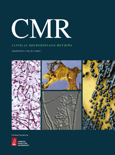
CLINICAL MICROBIOLOGY REVIEWS
Navigating the landscape of epidemiology and immunology.CLINICAL MICROBIOLOGY REVIEWS, published by the American Society for Microbiology, is a leading journal in the fields of epidemiology, immunology, and microbiology, notably recognized for its Q1 status in multiple categories such as Infectious Diseases and Public Health. With an ISSN of 0893-8512 and E-ISSN of 1098-6618, this esteemed journal offers comprehensive reviews and analyses that contribute to the advancement of clinical microbiology practices worldwide. Since its inception in 1988, it has established itself as a pivotal resource for researchers and healthcare professionals, delivering high-quality, peer-reviewed articles that are instrumental in understanding microbial diseases. The journal is highly regarded in the academic community, boasting impressive Scopus rankings, including Rank #1 in Medical Microbiology and a commendable 99th percentile in Public Health. Although not available as an open-access publication, CLINICAL MICROBIOLOGY REVIEWS remains an essential tool for those seeking to enhance their knowledge and practice in microbiology, making significant impacts on clinical outcomes and public health initiatives.

EPIDEMIOLOGIE MIKROBIOLOGIE IMUNOLOGIE
Advancing Knowledge in Health SciencesEPIDEMIOLOGIE MIKROBIOLOGIE IMUNOLOGIE is a prominent scholarly journal published by CESKA LEKARSKA SPOLECNOST J EV PURKYNE in the Czech Republic. With an ISSN of 1210-7913, this journal has been at the forefront of research since its inception in 1994, showcasing a rich repository of studies bridging the domains of epidemiology, microbiology, immunology, and infectious diseases, and reflecting advancements over three decades. Although it currently falls within the Q4 category in multiple fields including Epidemiology and Microbiology, the journal serves an essential role in disseminating knowledge and fostering discussions around public health challenges. The contributions made through its pages are vital for researchers, healthcare professionals, and students aiming to enhance their understanding of complex biomedical issues. While it does not offer open access, the journal remains a critical resource in its niches, inviting readers to engage with the latest findings and methodologies reshaping the landscape of health science.

Infectious Microbes & Diseases
Pioneering insights in microbiology and epidemiology.Infectious Microbes & Diseases, published by Lippincott Williams & Wilkins, is a premier journal dedicated to the exploration and understanding of infectious diseases, microbiology, and epidemiology. With its focused scope and robust peer-review process, the journal aims to disseminate high-quality research that contributes to advancements in the field, making it an essential resource for researchers, healthcare professionals, and students alike. Established in 2019, it has quickly gained recognition, achieving a Q3 rating in categories such as Epidemiology, Infectious Diseases, and Medical Microbiology in 2023, and ranking in the top half of its field within Scopus metrics. Although currently offered as a subscription-based journal, Infectious Microbes & Diseases significantly enriches its disciplines by inviting innovative research and critical review articles, thus playing a vital role in combating the global challenges posed by infectious diseases.